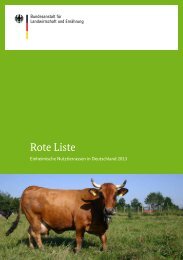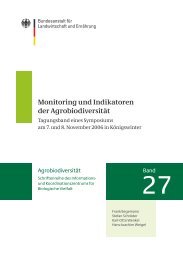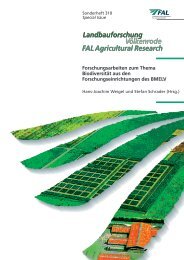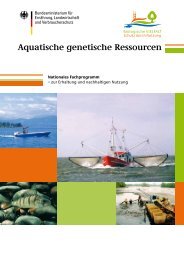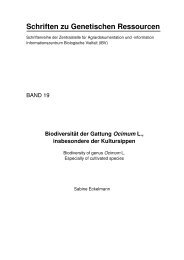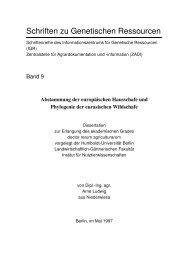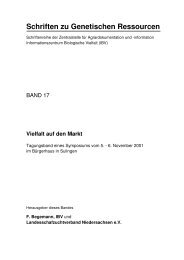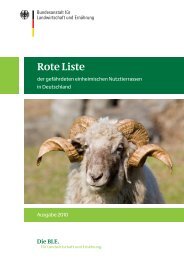- Page 1 and 2:
Schriften zu Genetischen Ressourcen
- Page 3 and 4:
Preface Preface In October 2001, th
- Page 5 and 6:
Preface Asia. M. CHAUVET (Montpelli
- Page 7 and 8:
Table of contents Table of contents
- Page 9 and 10:
Table of contents Utilisation of pl
- Page 11 and 12:
Table of contents Federal Informati
- Page 13 and 14:
Recollections of Rudolf Mansfeld Af
- Page 15 and 16:
Recollections of Rudolf Mansfeld Ma
- Page 17 and 18:
Recollections of Rudolf Mansfeld MA
- Page 19 and 20:
R. Mansfeld’s scientific influenc
- Page 21 and 22:
R. Mansfeld’s scientific influenc
- Page 23 and 24:
R. Mansfeld’s scientific influenc
- Page 25 and 26:
R. Mansfeld’s scientific influenc
- Page 27 and 28:
R. Mansfeld’s scientific influenc
- Page 29 and 30:
History of Plant Genetic Resources
- Page 31 and 32:
History of Plant Genetic Resources
- Page 33 and 34:
Mansfeld's Encyclopedia of Agricult
- Page 35 and 36:
Mansfeld's Encyclopedia of Agricult
- Page 37 and 38:
Mansfeld's Encyclopedia of Agricult
- Page 39 and 40:
Mansfeld's Encyclopedia of Agricult
- Page 41 and 42:
Mansfeld's Encyclopedia of Agricult
- Page 43 and 44:
The "Mansfeld Database" in its nati
- Page 45 and 46:
The "Mansfeld Database" in its nati
- Page 47 and 48:
A Species Compendium for Plant Gene
- Page 49 and 50:
A Species Compendium for Plant Gene
- Page 51 and 52:
A Species Compendium for Plant Gene
- Page 53 and 54:
Some notes on problems of taxonomy
- Page 55 and 56:
Some notes on problems of taxonomy
- Page 57 and 58:
Some notes on problems of taxonomy
- Page 59 and 60:
Some notes on problems of taxonomy
- Page 61 and 62:
Some notes on problems of taxonomy
- Page 63 and 64:
Theoretical and practical problems
- Page 65 and 66:
Theoretical and practical problems
- Page 67 and 68:
Theoretical and practical problems
- Page 69 and 70:
Theoretical and practical problems
- Page 71 and 72:
Development of Vavilov’s concept
- Page 73 and 74:
Development of Vavilov’s concept
- Page 75 and 76:
Development of Vavilov’s concept
- Page 77 and 78:
Development of Vavilov’s concept
- Page 79 and 80:
Development of Vavilov’s concept
- Page 81 and 82:
Development of Vavilov’s concept
- Page 83 and 84:
Multiple domestications and their t
- Page 85 and 86:
Multiple domestications and their t
- Page 87 and 88:
Multiple domestications and their t
- Page 89 and 90:
Multiple domestications and their t
- Page 91 and 92:
Multiple domestications and their t
- Page 93 and 94:
Multiple domestications and their t
- Page 95 and 96:
Ethnobotanical studies on cultivate
- Page 97 and 98:
Ethnobotanical studies on cultivate
- Page 99 and 100:
Ethnobotanical studies on cultivate
- Page 101 and 102:
Ethnobotanical studies on cultivate
- Page 103 and 104:
Ethnobotanical studies on cultivate
- Page 105 and 106:
Ethnobotanical studies on cultivate
- Page 107 and 108:
Ethnobotanical studies on cultivate
- Page 109 and 110:
Inventorying food plants in France
- Page 111 and 112:
Inventorying food plants in France
- Page 113 and 114:
Inventorying food plants in France
- Page 115 and 116:
Inventorying food plants in France
- Page 117 and 118:
Inventorying food plants in France
- Page 119 and 120:
The neglected diversity of immigran
- Page 121 and 122:
The neglected diversity of immigran
- Page 123 and 124:
The neglected diversity of immigran
- Page 125 and 126:
The neglected diversity of immigran
- Page 127 and 128:
The neglected diversity of immigran
- Page 129 and 130:
The neglected diversity of immigran
- Page 131 and 132:
The neglected diversity of immigran
- Page 133 and 134:
Unconscious selection in plants und
- Page 135 and 136:
Unconscious selection in plants und
- Page 137 and 138:
Unconscious selection in plants und
- Page 139 and 140:
Unconscious selection in plants und
- Page 141 and 142:
R. V. BOTHMER, TH. V. HINTUM, H. KN
- Page 143 and 144:
R. V. BOTHMER, TH. V. HINTUM, H. KN
- Page 145 and 146:
R. V. BOTHMER, TH. V. HINTUM, H. KN
- Page 147 and 148:
R. V. BOTHMER, TH. V. HINTUM, H. KN
- Page 149 and 150:
Diversity of African vegetable Sola
- Page 151 and 152:
Diversity of African vegetable Sola
- Page 153 and 154:
Diversity of African vegetable Sola
- Page 155 and 156:
Diversity of African vegetable Sola
- Page 157 and 158:
Diversity of African vegetable Sola
- Page 159 and 160:
Diversity of African vegetable Sola
- Page 161 and 162:
Diversity of African vegetable Sola
- Page 163 and 164:
Diversity of African vegetable Sola
- Page 165 and 166: Molecular diversity studies in two
- Page 167 and 168: The history of the medieval vegetab
- Page 169 and 170: The history of the medieval vegetab
- Page 171 and 172: The history of the medieval vegetab
- Page 173 and 174: The history of the medieval vegetab
- Page 175 and 176: The history of the medieval vegetab
- Page 177 and 178: The history of the medieval vegetab
- Page 179 and 180: Paintings from the 16 th to 18 th c
- Page 181 and 182: Sugar beets and related wild specie
- Page 183 and 184: Sugar beets and related wild specie
- Page 185 and 186: Sugar beets and related wild specie
- Page 187 and 188: Sugar beets and related wild specie
- Page 189 and 190: Sugar beets and related wild specie
- Page 191 and 192: Sugar beets and related wild specie
- Page 193 and 194: Utilisation of plant genetic resour
- Page 195 and 196: Utilisation of plant genetic resour
- Page 197 and 198: Utilisation of plant genetic resour
- Page 199 and 200: Utilisation of plant genetic resour
- Page 201 and 202: Utilisation of plant genetic resour
- Page 203 and 204: Proof of long-term stored potato ge
- Page 205 and 206: Proof of long-term stored potato ge
- Page 207 and 208: Proof of long-term stored potato ge
- Page 210 and 211: 199
- Page 212 and 213: Structure of table ScientificName L
- Page 214 and 215: Genebank work for preservation of t
- Page 218 and 219: 206 S. CHEBOTAR, M.S. RÖDER, V. KO
- Page 220 and 221: Molecular diversity in the genus Am
- Page 222 and 223: Molecular diversity in the genus Am
- Page 224 and 225: Molecular diversity in the genus Am
- Page 226 and 227: Molecular diversity in the genus Am
- Page 228 and 229: A. DIEDERICHSEN, D. KESSLER, P. KUS
- Page 230 and 231: A. DIEDERICHSEN, D. KESSLER, P. KUS
- Page 232 and 233: D. ENNEKING and H. KNÜPFFER Fishin
- Page 234 and 235: References D. ENNEKING and H. KNÜP
- Page 236 and 237: A.A. FILATENKO, K. PISTRICK, H. KN
- Page 238 and 239: A.A. FILATENKO, K. PISTRICK, H. KN
- Page 240 and 241: A.A. FILATENKO, K. PISTRICK, H. KN
- Page 242 and 243: A.A. FILATENKO, K. PISTRICK, H. KN
- Page 244 and 245: A.A. FILATENKO, K. PISTRICK, H. KN
- Page 246 and 247: Pyrus L. Secale L. Sorbus L. Trifol
- Page 248 and 249: A.A. FILATENKO, K. PISTRICK, H. KN
- Page 250 and 251: A.A. FILATENKO, K. PISTRICK, H. KN
- Page 252 and 253: A.A. FILATENKO, K. PISTRICK, H. KN
- Page 254 and 255: A.A. FILATENKO, K. PISTRICK, H. KN
- Page 256 and 257: Vigna angularis (Willd.) Ohwi et Oh
- Page 258 and 259: A.A. FILATENKO, K. PISTRICK, H. KN
- Page 260 and 261: Lycopersicon Mill. Nicotiana L. Sal
- Page 262 and 263: A.A. FILATENKO, K. PISTRICK, H. KN
- Page 264 and 265: A.A. FILATENKO, K. PISTRICK, H. KN
- Page 266 and 267:
Pyrus communis L. Trachomitum sarma
- Page 268 and 269:
R. macropetalus Dougl. ex Hook. R.
- Page 270 and 271:
U. FREYTAG, G.H. BUCK-S ORLIN and B
- Page 272 and 273:
U. FREYTAG, G.H. BUCK-S ORLIN and B
- Page 274 and 275:
U. FREYTAG, G.H. BUCK-S ORLIN and B
- Page 276 and 277:
U. FREYTAG, G.H. BUCK-S ORLIN and B
- Page 278 and 279:
U. FREYTAG, G.H. BUCK-S ORLIN and B
- Page 280 and 281:
Tab. 1: Actual European strawberry
- Page 282 and 283:
H. GRAUSGRUBER, H. BOINTNER, R. TUM
- Page 284 and 285:
yield / plant (g) resistance score
- Page 286 and 287:
H. GRAUSGRUBER, H. BOINTNER, R. TUM
- Page 288 and 289:
E.R.J. KELLER, A. SENULA and H. SCH
- Page 290 and 291:
E.R.J. KELLER, A. SENULA and H. SCH
- Page 292 and 293:
E.R.J. KELLER, A. SENULA and H. SCH
- Page 294 and 295:
Molecular mapping and geographical
- Page 296 and 297:
English translation of the 1979 Rus
- Page 298 and 299:
Development and evaluation of a Bra
- Page 300 and 301:
Development and evaluation of a Bra
- Page 302 and 303:
Development and evaluation of a Bra
- Page 304 and 305:
Maca (Lepidium meyenii) - cultivati
- Page 306 and 307:
Maca (Lepidium meyenii) - cultivati
- Page 308 and 309:
Mansfeld's Encyclopedia and Databas
- Page 310 and 311:
Mansfeld's Encyclopedia and Databas
- Page 312 and 313:
The Information System On Plant Gen
- Page 314 and 315:
The Information System On Plant Gen
- Page 316 and 317:
Characterisation of spring barley g
- Page 318 and 319:
Characterisation of spring barley g
- Page 320 and 321:
Characterisation of spring barley g
- Page 322 and 323:
Evaluation of genetic resources for
- Page 324 and 325:
Establishment of a German Network f
- Page 326 and 327:
Establishment of a German Network f
- Page 328 and 329:
Central register for biological res
- Page 330 and 331:
Central register for biological res
- Page 332 and 333:
Federal Information System Genetic
- Page 334 and 335:
Federal Information System Genetic
- Page 336 and 337:
Identification of novel interspecif
- Page 338 and 339:
Identification of novel interspecif
- Page 340 and 341:
Identification of novel interspecif
- Page 342 and 343:
Morphological characters in garlic
- Page 344 and 345:
Morphological characters in garlic
- Page 346 and 347:
Morphological characters in garlic
- Page 348 and 349:
Resynthesised Brassica napus as a g
- Page 350 and 351:
Resynthesised Brassica napus as a g
- Page 352 and 353:
Temperate homegardens of small alpi
- Page 354 and 355:
List of participants List of Partic
- Page 356 and 357:
List of participants Fischer, Manfr
- Page 358 and 359:
List of participants Lühs, Wilfrie
- Page 360 and 361:
List of participants Ruge, Brigitte



